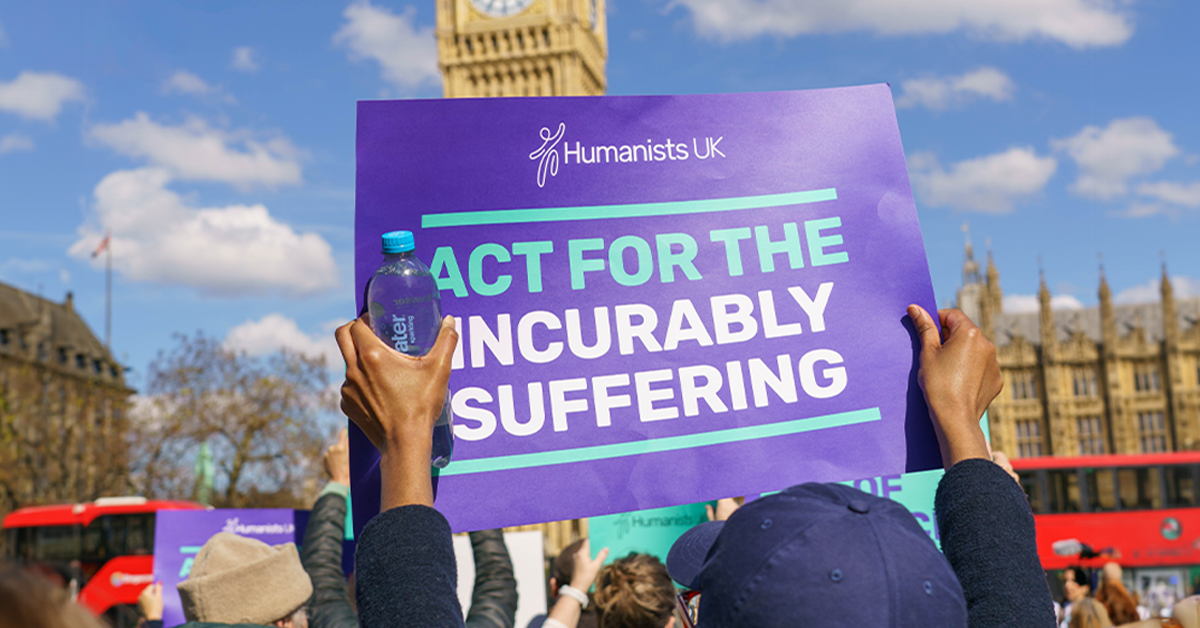
A debate held yesterday in Westminster heard strong arguments for a change in the law on assisted dying. Humanists UK applauds those who attended and spoke at the debate, which is a step forward in the national conversation on assisted dying.
The debate provided a platform for robust discussion on the need for legislative reform, came in response to a petition started by Dame Esther Rantzen which now has over 200 000 signatures. Humanists UK members rallied outside parliament to show the depth of public support for a change.
Rachel Hopkins MP, Vice Chair of the All Party Parliamentary Humanist Group, said:
‘The lack of safeguards, regulation and oversight forces dying individuals to take matters into their own hands without adequate support for them or their families. As a humanist, I believe in individuals’ right to make informed choices about their own care and quality of life, and I do not believe that people should be forced into making horrible, lonely decisions to end their own life, something that the blanket ban on assisted dying in this country fails to recognise.’
Kit Malthouse MP, showing that support comes from across the political spectrum, said:
‘British people do not understand how people of a genuine religious faith can seek to impose their own morality on the rest of us. They have not done so on gay marriage. They did not do so on homosexuality, adultery, abortion or sex before marriage. Why on this issue should the British people be denied a choice, because of the—certainly legitimately held—religious convictions of others? If the law changes, as I hope it will, and assisted dying becomes available, in extremis, to me and others, people need to realise that it is not compulsory. You may not want it yourself, and you may not want it for your relatives, but please do not stop me having it.’
Many who spoke at the debate did so from very personal perspectives, telling stories of their own experiences of the deaths of family members and friends. There were also many stories from their constituents.
Steve Brine MP, who chaired the Health and Social Care Committee Inquiry, said:
‘We did not find any evidence that the quality of palliative and end-of-life care deteriorated after the introduction of assisted dying in those jurisdictions; in fact, there is some evidence to suggest that there has been an increase in the funding of palliative care services, which I think is interesting. I hope that colleagues follow up the point that some hon. Members have already made: there will probably be legislative changes elsewhere in the UK, and certainly in the Crown dependencies in the coming months. Ministers need to be ready to respond to that, whatever their intention for the law in England.’
Throughout the session, MPs engaged with complex ethical and practical considerations surrounding assisted dying. Humanists UK welcomed the diversity of perspectives expressed, recognising the need for nuanced and evidence-based policymaking.
Laura Farris MP, responding on behalf of the Government, stated that the Government would work closely with other jurisdictions in the UK and the Crown dependencies where assisted dying bills are progressing, to consider the practical implications, but stopped short of confirming any positive action for England and Wales.
Director of Public Affairs and Policy Kathy Riddick commented:
‘This debate and the petition which prompted it show the overwhelming support from the public for a change in the law. Many MPs spoke passionately about their personal views, for and against a change, but the vast majority of the population want to see action.
‘Choice at end of life should be a basic right and we ask that the Government take notice of the surrounding jurisdictions and weight of public opinion, and act to make a compassionate law for England and Wales.’
Humanists UK supports assisted dying in the UK and crown dependencies for those who have made a clear decision, free from coercion, to end their lives and who are physically unable to do so themselves. Humanists UK supports this for people who are of sound mind and are either terminally ill or incurably suffering, and on the basis that there are robust safeguards. Humanists defend the right of each individual to live by their own personal values, and the freedom to make decisions about their own life so long as this does not result in harm to others. It is possible for an assisted dying law to enhance people’s freedoms in precisely this way.
Notes
For further comment or information, media should contact Humanists UK Director of Public Affairs and Policy Kathy Riddick at press@humanists.uk or phone 07534 248 596.
Read more about our work on assisted dying.
Humanists UK is the national charity working on behalf of non-religious people. Powered by over 120,000 members and supporters, we advance free thinking and promote humanism to create a tolerant society where rational thinking and kindness prevail. We provide ceremonies, pastoral care, education, and support services benefitting over a million people every year and our campaigns advance humanist thinking on ethical issues, human rights, and equal treatment for all.
